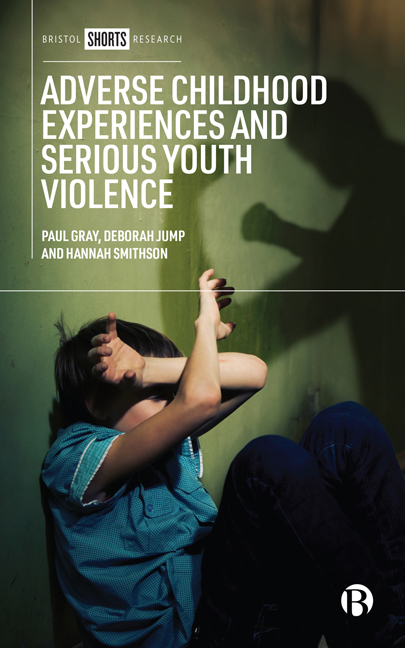Book contents
- Frontmatter
- Contents
- List of Figures and Tables
- Acknowledgements
- One Introduction
- Two Review of the Literature
- Three Researching Adverse Childhood Experiences and Trauma
- Four Serious Youth Violence
- Five Adverse Childhood Experiences
- Six The Relationship between Adverse Childhood Experiences and Serious Youth Violence
- Seven Trauma-informed Practice
- Eight Conclusions
- Notes
- References
- Index
Eight - Conclusions
Published online by Cambridge University Press: 18 January 2024
- Frontmatter
- Contents
- List of Figures and Tables
- Acknowledgements
- One Introduction
- Two Review of the Literature
- Three Researching Adverse Childhood Experiences and Trauma
- Four Serious Youth Violence
- Five Adverse Childhood Experiences
- Six The Relationship between Adverse Childhood Experiences and Serious Youth Violence
- Seven Trauma-informed Practice
- Eight Conclusions
- Notes
- References
- Index
Summary
Recommendations
Based on the findings described in the preceding chapters, this research makes the following recommendations:
• Deliver training around implementing trauma-informed practice
While youth justice workers acknowledged that they had received some general training on adverse childhood experiences (ACEs) and trauma-informed approaches, what they felt was lacking was more specific training in how to implement trauma-informed practice in a more psychotherapeutic way. Training to address this need should be delivered by qualified professionals.
• Deliver training across the wider youth justice system
Funding should be made available for qualified professionals to deliver training on ACEs and trauma-informed practice to other bodies in the youth justice system, such as the courts, the police and the secure estate. This will help to embed an awareness of ACEs and trauma-informed practice throughout the justice system. This systemic approach is necessary to ensure that young people receive a consistent, trauma-informed service, irrespective of which stage of the system they are at.
• Provide psychotherapeutic support to those young people who need it
Clinical psychotherapeutic support around trauma should be readily available to those young people who may need it (see Lemma and Young 2022). The responsibility for delivering this particular support should not lie with youth justice workers. Placing it with them has the potential to harm both youth justice workers and young people. Instead, as is the case in Manchester, clinical support should be delivered by qualified professionals based within youth justice services.
• Offer clinical supervision to youth justice workers
If youth justice workers are expected to deliver trauma-informed practice, then the opportunity for clinical supervision with a qualified professional should be made available to protect them from vicarious trauma. This provision should be in addition to any other supervision procedures that youth justice services currently offer.
• Support young people to meaningfully participate
In line with a Child First approach (Youth Justice Board 2021), justice-involved young people should be supported and encouraged to participate in the development of trauma-informed responses to serious youth violence (SYV) as they are ‘by far the most beneficial group to involve’ (Fraser and Irwin-Rogers 2021: 17).
- Type
- Chapter
- Information
- Adverse Childhood Experiences and Serious Youth Violence , pp. 100 - 105Publisher: Bristol University PressPrint publication year: 2023



